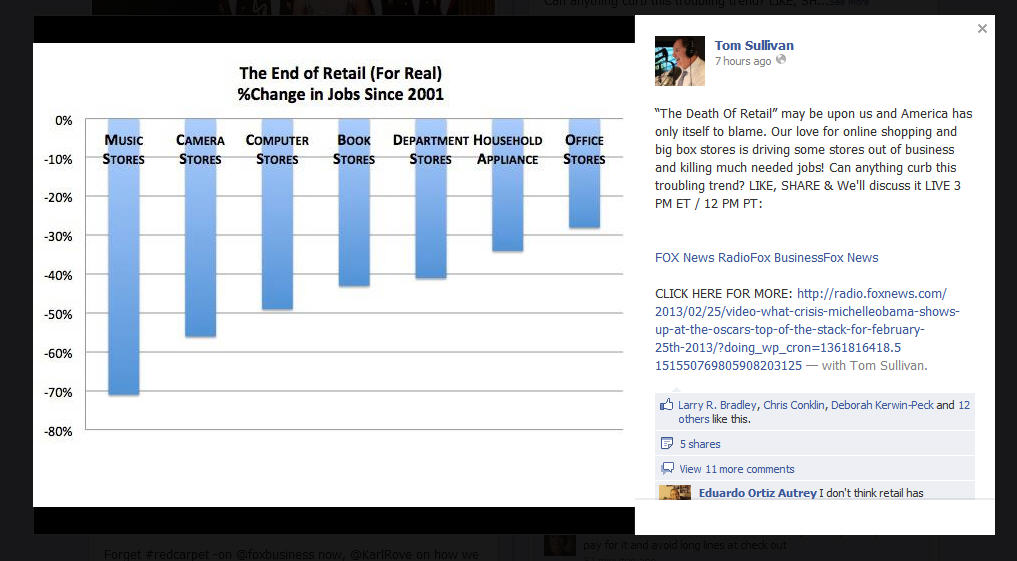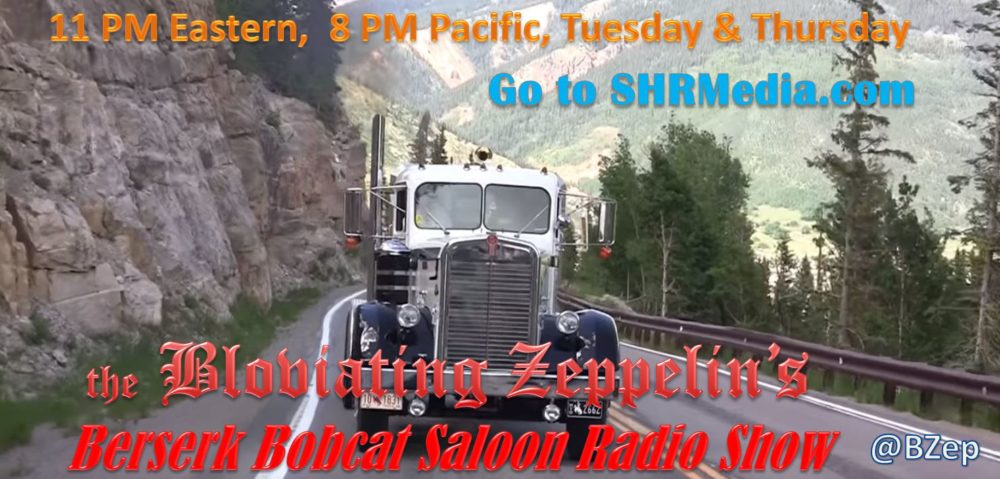Vice President Joe Biden says that Americans are no longer worried about the economy:
“But all kidding aside, I think the American people have moved — Democrats, Republicans, independents. They know that the possibilities for this country are immense. They’re no longer traumatized by what was a traumatizing event, the great collapse in 2008. They’re no longer worried, I think, about our economy being overwhelmed either by Europe writ large, the EU, or China somehow swallowing up every bit of innovation that exists in the world. They’re no longer, I think, worried about our economy being overwhelmed beyond our shores.”
Americans are no longer worried about the economy? Really? You think that’s true?
I think that’s not just a fabrication, but a bald-faced LIE.
Retail is — on many levels — starting to become moribund.
Check this graphic from TomSullivan.com:
 You can see that music stores are apparently the most greatly impacted with employee and store outlet loss, followed by camera and computer stores.
You can see that music stores are apparently the most greatly impacted with employee and store outlet loss, followed by camera and computer stores.
I’m sure you can see the results of retail outlet closures in your own community — no matter where you are, on the east coast, the west coast, north or south.
The retail paradigm is changing, and it is changing not unlike the replacement of the horse with the car, or the steam locomotive with the diesel-electric locomotive.
So-called Mega Malls are changing; so are regular malls. Stores are closing. Chain stores are closing.
You are responsible. I am responsible. And yet, I certainly very much miss my local Borders book stores. They closed. There are only two Barnes & Noble stores in Sacramento — the capital of Fornicalia — and both of them are incredibly inconvenient for me. Yet, I go there, because that’s how I become aware of new books.
I can see them, I can hold them, I can smell them, I can read their covers, suss out their basic premise, and scan a few pages to see if I like the writing itself.
My Tower Records store closed. Tower Books closed. Virgin Records closed. It was a HUGE store at Arden Fair Mall.
I step back: there was a small and wonderful music store in Grass Valley, on Mill Street, in the mid-1990s, where you could walk in and sit at a counter and ask to see a specific CD. You could hold it in your hand, check out its cover, place the CD into a player and, with headphones donned, listen to the content. If you liked it, you bought it. I was generally the oldest bastard in the place, where the chicks were tattooed and pierced and dyed but here is where I found out about the groups Material, Bill Laswell, Bill Nelson, Deep Forest, Blue Man Group, and any number of artists who otherwise wouldn’t have been displayed on my musical radar screen. My musical expanses were challenged and exploded. I loved it.
But — moreover — what does the “end of retail” mean for younger people? I expect: much.
From TheAtlantic.com:
We see a large and growing gap between unemployment and the employment-population ratio. There are numerous micro explanations here.
One possibility, however, is that the relatively weak growth in shopping center employment relative to retail sales since 2000 and especially recently is driving down overall teen employment levels.
However, because teenagers are especially suited to shopping center employment they are dropping out of the labor force in response. That is, the End of Retail is causing a permanent shift in teenage employment because there are no substitutes for retail jobs.
This is a true structural downturn because it means that the production function is changing such that the productivity of teenage labor cannot meet the reservation wage.
When that happens a factor of production simply goes out of use. It also implies that for a time the economic gains from productivity enhancements will be muted. E-commerce means more efficient shopping but because we are not repurposing teenage labor but losing it completely, the measured gains are less than they otherwise would be.
Retail work — for me, possibly for you — was essentially a Rite of Passage in the 60s and 70s. You worked for a retail store and you learned how to deal with people and you learned how to work with a boss and you learned how to work with a time card and you learned how to show up at a specific time or you simply wouldn’t get paid.
You learned how to open a store, or you learned how to close a store. You learned how to prep a store for the next day. You cleaned up. You mopped the floors. Or you learned how to prep the register with cash for the coming day. You learned how to make a night deposit. You learned how to make change. With no calculator except that of your brain.
I worked for the JC Penney store on Watt Avenue. I knew 35mm photography. I sold the greatest amount of cameras. I helped my customers. I cleaned their lenses, I told them how to change their ISO, I sold them SX70 cameras. I worked in retail and I worked on a very basic and meager salary but with commission. My commission was generally the greatest of everyone else, for the three months I worked there.
Those days — these days — are apparently dying.
Amazon and any number of .com websites are making it so.
Any thoughts of yours? What are you seeing — if anything — in your community?
Where you live — is retail taking a hit?
BZ


